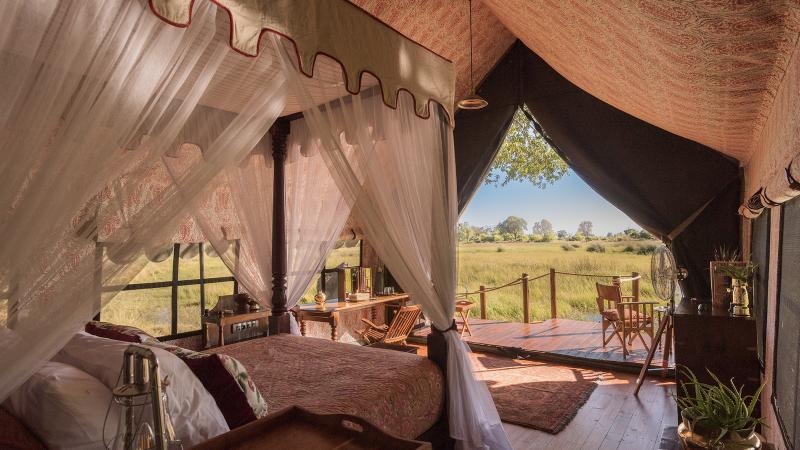Jack’s Camp ventures into new territory with the opening of Natural Selection’s Duke’s Camp in the northern Okavango Delta. Rebuilt in 2020 by the camp’s owner and founder, Ralph Bousfield, Jack’s Camp was originally idealized by his father, Jack Bousfield, in 1962. Jack was a professional hunter and set up his own makeshift camp using quad bikes at a spot he discovered when hunting in the ’60s—years later becoming the exact spot the Kalahari legend Jack’s Camp would be located. While Jack’s Camp has long taken its cue from the desert, Duke’s Camp draws its inspiration from the Okavango Delta, consisting of over 50 percent of recycled and upcycled materials from Natural Selection’s resources.
Duke’s Camp is named in honor of Sarefo “Duke” Sarefo, the custodian of this 220,000-acre piece of wilderness. His forefathers of the Wayeyi tribe worked the waters of the Okavango Delta as traditional fishermen and called the Kgao Island home for three generations. In 2002, Duke applied to take ownership of the island to acknowledge his family’s heritage and has since remained dedicated to protecting and preserving the island, working in partnership with Unchartered Africa to encourage eco-tourism to safeguard the island for generations of the Sarefo family.
Guests can expect six twin tents and two double luxurious safari tents, which are pitched on raised wooden decks beneath a canopy of trees and sport Persian rugs and hand-carved four-poster beds. Interiors include mahogany sideboards filled with African memorabilia, richly patterned kilims atop wooden floors and a butler tray decked with a pot of filter coffee in the morning.

Each tent offers an en-suite bathroom and a private viewing deck. Leather campaign chairs offer the opportunity for spontaneous game sightings. The main mess area at Duke’s Camp exudes "old-world glamour;" its Persian tea-tent has been taken from the old Jack’s Camp and updated in the Natural Selection workshop to fit Duke’s.
Over 50 percent of Duke’s Camp is recycled and upcycled, including the central mess tent, the individual tents, most of the furniture and the tea-tent with swing beds from Jack’s Camp, and the beds from San Camp. “If anything is broken, we repeat and fix it before we throw it away,” said Linda Matiki, camp project manager at Natural Selection. “We are so proud of making things work again; it’s not always about getting something new, this is our mentality.” Completely new features of the camp include the linen and bedding, lining inside the mess tent, kitchen equipment, the pine decks the camps rest on, and the entire back-of-house structure.
Guests can go on guided game drives in the morning, afternoon and night. The area is home to healthy populations of lion, leopard, cheetah, elephant, the semi-aquatic red lechwe, rare sitatunga antelope, and more than 440 species of birds.
Related Articles
Asilia Africa to Open Usangu Expedition Camp in June
Wilderness Safaris' Vumbura Plains Reopens After Reno
Sanctuary Retreats Expands in Africa With Namibia Properties